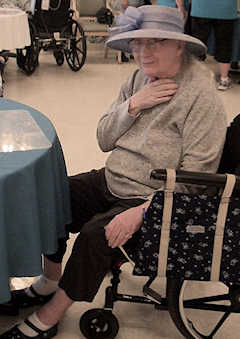How To Manage Your Loved One’s Care Remotely

With thanks to advocate and guest blogger, Cheryl Scharoun (edited by Audrey Zhang)
Find Cheryl’s advocacy profile here: Baby Boom Health
Do you have a loved one in a Rehabilitation or Skilled Nursing Facility? Are you trying to manage your loved one's care from afar? If so, you're probably experiencing a range of emotions. These are scary times to say the least. Guilt, isolation, uncertainty, fear, and feeling helpless are just a few.
If you don't live nearby, you may not be able to visit, or not as often or for as long as you'd like. So how do you manage that anxiety from a distance? Have you called the facility and not gotten a reply? If so, your frustration and anxiety probably escalate.
Here are some tips that may help.
- Remember, the facilities are dealing with a lot. Prepare your questions ahead of time so you can ask them quickly and efficiently.
- Establish a contact person at the facility. Asking your pre-prepared questions will show the staff that you are knowledgeable and on top of your game. It will also show them you respect their time.
- Does your loved one have advance care planning in place, including a living will, healthcare proxy (or healthcare power of attorney)? Does the facility have a copy of those documents? It is imperative that the staff knows what your loved one wants and does not want.
 Work with the facility to establish a way to communicate with your loved one. When you are able to communicate with your loved one, what do you do with information you get? Communicating that information to the staff is important, but it may be challenging. Make sure you have a plan in place with the facility on how to handle that information. Remember, no issue or concern is too small. If it concerns your loved one, the team that cares for them need to know.
Work with the facility to establish a way to communicate with your loved one. When you are able to communicate with your loved one, what do you do with information you get? Communicating that information to the staff is important, but it may be challenging. Make sure you have a plan in place with the facility on how to handle that information. Remember, no issue or concern is too small. If it concerns your loved one, the team that cares for them need to know.- If your loved one is in the facility for short-term rehab, have you discussed the discharge plan? The staff needs to know your goals. They will help you prepare to care for your loved one at home.
- Getting them home may reduce their depression and isolation. However, it will also probably add new stressors on you. Will you be able to be their caregiver? Can you find someone to help play that role? Even if you're doing your part from a different location, you should try to be rested and ready for them to come home. Creating a plan will help you manage some of the stress.
If this transition seems overwhelming, a professional, independent patient advocate can help support you and oversee the care of your loved one remotely. The goal is to eliminate your stress by providing you the information that can alleviate your fears. Everyone needs support, especially when their issues and concerns are going unnoticed. It’s even more true if you’re not physically nearby and have to rely on phone calls, Zoom meetings, or intermittent visits. A patient advocate can offer that guidance and continuous support, for both you and your loved one.
Find a Health / Patient Advocate or Care Manager
Learn more about The Alliance of Professional Health Advocates

 Work with the facility to establish a way to communicate with your loved one. When you are able to communicate with your loved one, what do you do with information you get? Communicating that information to the staff is important, but it may be challenging. Make sure you have a plan in place with the facility on how to handle that information. Remember, no issue or concern is too small. If it concerns your loved one, the team that cares for them need to know.
Work with the facility to establish a way to communicate with your loved one. When you are able to communicate with your loved one, what do you do with information you get? Communicating that information to the staff is important, but it may be challenging. Make sure you have a plan in place with the facility on how to handle that information. Remember, no issue or concern is too small. If it concerns your loved one, the team that cares for them need to know.